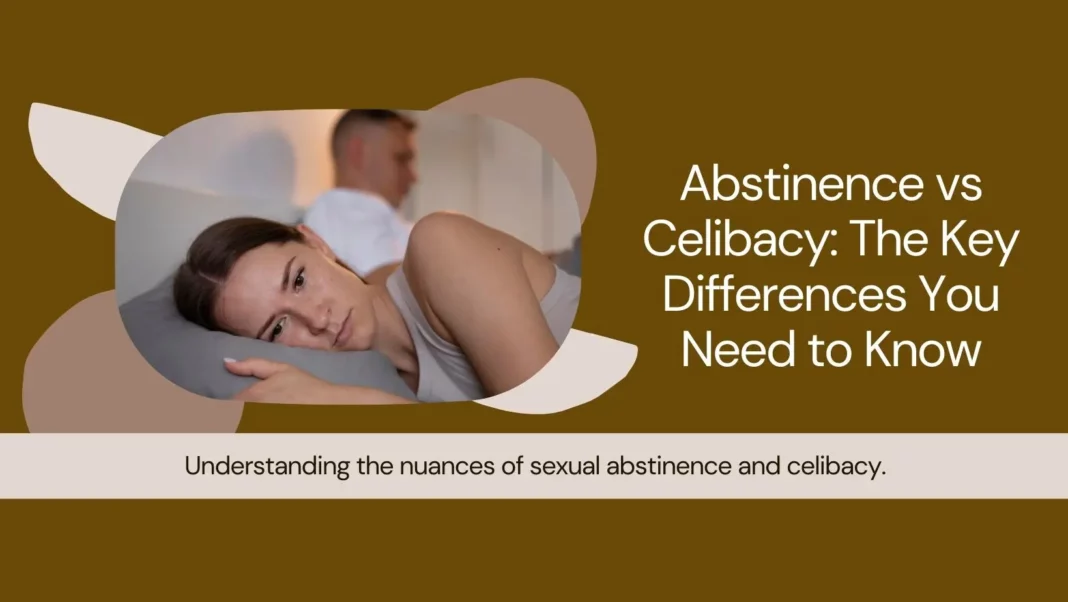Are you feeling torn between the concepts of celibacy and abstinence, trying to understand which path aligns best with your values and goals? The decision to embark on a journey of sexual abstinence or celibacy can be a profound one, influenced by a myriad of factors such as personal beliefs, cultural norms, and practical considerations.
In this exploration, we will delve into the distinctions between celibacy and abstinence, highlighting their similarities and differences. We’ll discuss the concept of chastity and the boundaries it sets, while addressing the question of whether any physical touching is permitted.
Moreover, we’ll examine the potential benefits and risks of these choices, shedding light on the factors to consider when selecting the right path for you.
What is Abstinence?

Abstinence is a practice that involves refraining from a specific behavior or action, often for a determined period or until certain conditions are met. In the context of this discussion, we primarily focus on sexual abstinence, which means voluntarily avoiding sexual activity. It’s important to note that abstinence can also apply to other areas of life, such as abstaining from alcohol, drugs, or certain foods.
- No Sexual Intercourse: The most common form of sexual abstinence involves abstaining from sexual intercourse. This means not engaging in any sexual activity that leads to penetration or potential reproduction.
- No Sexual Contact: Some individuals practicing sexual abstinence choose to avoid any form of sexual contact, which includes activities like kissing, fondling, or any intimate touch.
Reasons for Choosing Abstinence
People may choose sexual abstinence for various reasons:
- Personal Beliefs: Many individuals abstain from sex due to personal, moral, or ethical beliefs. This could be influenced by cultural, religious, or spiritual values.
- Health Concerns: Abstinence can be a choice for those who want to avoid the risks associated with sexual activity, including sexually transmitted infections (STIs) and unplanned pregnancies.
- Emotional Well-being: Some people decide to abstain from sex as a way to protect their emotional well-being, focusing on building strong emotional connections before engaging in physical intimacy.
- Education and Career Goals: Students or individuals with ambitious career goals may choose abstinence to concentrate on their education or professional development without the distractions that can come with sexual relationships.
- Relationship Building: Abstinence can also be a means of strengthening a romantic relationship. Couples may choose to abstain from sex before marriage or during certain periods to foster emotional intimacy.
Common Misconceptions
- Abstinence Is Always Religious: One common misconception is that abstinence is solely a religious practice. While it’s a choice for many based on religious beliefs, it can also be a personal or practical decision.
- Abstinence Is Easy: Abstinence may not be easy for everyone. It can be a challenging choice, and individuals need support and understanding from their partners, friends, and society.
In essence, abstinence involves a deliberate choice to abstain from sexual activity for various reasons, which can be personal, cultural, or practical. It’s not limited to religious motivations and can play a crucial role in one’s physical and emotional well-being.
What is Celibacy?

Celibacy is a state of abstaining from all forms of sexual activity, often for religious, cultural, personal, or ethical reasons. Unlike abstinence, which can be a temporary or selective choice to avoid sexual activity, celibacy is typically a more long-term or even lifelong commitment to refraining from sexual relations. Here, we’ll delve into the concept of celibacy and explore its various facets.
- Complete Sexual Abstinence: Celibacy involves complete avoidance of any sexual activity, including intercourse, intimate touching, or romantic involvement.
- Lifelong Commitment: While celibacy can be practiced for a specific period, it is commonly associated with a lifelong commitment, particularly in religious or monastic contexts.
Religious and Cultural Contexts
Celibacy often has strong religious and cultural ties. It is frequently associated with religious orders, clergy, and spiritual leaders in many faiths. For example:
- Clerical Celibacy: In some religions, priests, monks, and nuns are required to remain celibate as a way of dedicating themselves wholly to their religious duties.
- Vows of Celibacy: Individuals may take vows of celibacy as a part of their religious or spiritual commitment, pledging to abstain from sexual relations for the entirety of their lives.
Reasons for Choosing Celibacy
There are diverse motivations for choosing celibacy:
- Religious Devotion: Many people choose celibacy as a way of deepening their spiritual connection and commitment to a religious faith.
- Personal Growth: Some individuals opt for celibacy as a path to self-discovery, self-improvement, or personal enlightenment.
- Moral and Ethical Beliefs: Celibacy can align with one’s moral and ethical beliefs, as it can signify a commitment to uphold certain values.
- Independence and Focus: Celibacy allows individuals to concentrate on personal goals, careers, or community service without the distraction of romantic or sexual relationships.
Common Misconceptions
- Celibacy Equals Asexuality: Celibacy is a choice to abstain from sexual activity, but it doesn’t necessarily mean that celibate individuals lack sexual desires or attraction. They consciously choose to refrain from acting on these desires.
- Celibacy Is Always Religious: While celibacy has strong religious roots, it can also be a personal or cultural choice. People from various backgrounds practice celibacy for secular reasons.
In conclusion, celibacy is a profound commitment to abstain from sexual activity, and it can have religious, cultural, personal, or ethical motivations. It’s not exclusive to religious leaders and can be a deeply personal choice that individuals make for various reasons.
Celibacy vs. Abstinence
Celibacy and abstinence are often mentioned together due to their shared characteristic of refraining from sexual activity. However, they differ in key aspects, such as the duration of the commitment, motivations, and the scope of what is avoided. Let’s delve into the distinctions between celibacy and abstinence to better understand these practices.
Duration and Commitment:
- Celibacy: Celibacy is typically a long-term or even lifelong commitment. Individuals who choose celibacy often make this decision with the intent of maintaining it for the rest of their lives, particularly in religious or monastic contexts.
- Abstinence: Abstinence can be temporary or selective. It may involve refraining from sexual activity for a defined period or until specific conditions are met. Abstaining individuals often view it as a choice that can change over time.
Motivations:
- Celibacy: Celibacy is often motivated by deeply-held religious, cultural, or spiritual beliefs. It’s seen as a commitment to a higher purpose, whether that’s service to a deity, personal growth, or devotion to a particular path.
- Abstinence: Abstinence can be motivated by a broader range of reasons. While it may include religious and moral motivations, individuals often choose abstinence for practical purposes, such as avoiding sexually transmitted infections (STIs) or focusing on educational and career goals.
Scope of Avoidance:
- Celibacy: Celibacy entails a complete avoidance of all sexual activity, which extends beyond intercourse to encompass any form of sexual contact or romantic involvement.
- Abstinence: Abstinence is often more specific and can apply to certain aspects of sexual activity. For example, someone might choose to abstain from intercourse but engage in other forms of sexual contact.
Practical Examples:
- Celibacy: A priest or nun in a religious order who vows to remain celibate as part of their commitment to their faith and community.
- Abstinence: A couple choosing to abstain from sexual intercourse until marriage while engaging in other forms of physical intimacy.
Celibacy and abstinence share the commonality of avoiding sexual activity, but they differ in terms of commitment duration, motivations, and the scope of what is avoided. Celibacy is typically a lifelong, deeply spiritual commitment, while abstinence is often a more flexible choice that can be influenced by various factors, including personal beliefs and practical considerations.
Chastity and Physical Boundaries
Chastity is a concept closely related to both abstinence and celibacy, as it deals with maintaining purity and virtue, especially in the context of sexual relationships. It plays a significant role in guiding the physical boundaries that individuals practicing abstinence and celibacy should adhere to.
Chastity Defined: Chastity refers to the state of being sexually pure, free from any form of sexual misconduct or impurity. It emphasizes the importance of self-control and moral integrity in sexual matters. Chastity is often considered a virtue, particularly in religious and cultural contexts.
Chastity in Abstinence: In the context of abstinence, chastity guides the physical boundaries that individuals should maintain. While the primary goal of abstinence is to abstain from sexual intercourse, chastity encourages individuals to avoid all forms of sexual misconduct, including intimate touching, fondling, and other actions that may lead to sexual activity.
Chastity in Celibacy: Celibacy, as a lifelong commitment to complete sexual abstinence, embodies the concept of chastity to its fullest extent. Those practicing celibacy are expected to adhere to the highest standards of chastity, refraining not only from sexual intercourse but also from any form of physical contact that has sexual or romantic undertones.
Physical Touching in Abstinence and Celibacy
The permissibility of physical touching varies in abstinence and celibacy, and it depends on personal beliefs, cultural norms, and specific circumstances. Here are some common considerations:
- Abstinence: In the context of abstinence, couples may set their own boundaries regarding physical touching. Some may choose to limit intimate contact, while others may engage in physical affection that does not lead to sexual activity. These boundaries are often based on the individual or couple’s values and comfort levels.
- Celibacy: Celibacy traditionally requires individuals to avoid any form of sexual or romantic touching, in keeping with the commitment to complete purity. This includes refraining from kissing, hugging, or other intimate physical interactions.
It’s important to note that the interpretation of chastity and physical boundaries can be subjective and vary greatly among individuals and cultural or religious groups.
While some may strictly adhere to the principles of chastity by avoiding all physical contact, others may adopt more permissive views, allowing certain forms of non-sexual physical touch.
Potential Benefits
Choosing celibacy or abstinence, while challenging in many ways, can also yield several potential benefits, both in the short term and long term. These advantages vary depending on individual motivations, life circumstances, and personal beliefs. Here, we’ll explore some of the potential benefits associated with these practices.
Emotional and Mental Well-being: Practicing celibacy or abstinence can promote emotional stability and mental clarity. By avoiding the complexities and potential emotional turbulence that can come with sexual relationships, individuals may experience a greater sense of inner peace and focus.
Stronger Personal Values: Choosing celibacy or abstinence often reflects a commitment to personal values, whether they are rooted in religious, moral, or ethical beliefs. This adherence to one’s principles can lead to a stronger sense of identity and purpose.
Reduced Health Risks: Abstaining from sexual activity can lower the risk of sexually transmitted infections (STIs) and unplanned pregnancies. This is a practical benefit that can help maintain physical well-being.
Focus on Self-development: Without the demands of romantic or sexual relationships, individuals can dedicate more time and energy to personal growth, career development, educational pursuits, and other self-improvement goals.
Freedom from Relationship Pressures: Celibacy and abstinence can free individuals from the pressures and expectations that often come with romantic relationships. They can foster a sense of independence and self-reliance.
Strengthened Relationships: For couples who choose abstinence until marriage, this can lead to stronger emotional connections and a foundation of trust in their relationship. By delaying sexual intimacy, they can build a deeper emotional bond.
Avoidance of Regret: Choosing celibacy or abstinence can help individuals avoid potential regrets associated with impulsive or ill-considered sexual encounters. It allows for more deliberate and meaningful decisions about when and with whom to engage in sexual activity.
Personal Freedom: Individuals practicing celibacy or abstinence have the freedom to make choices that align with their beliefs and values. This autonomy can lead to a strong sense of self-determination.
Empowerment: Practicing celibacy or abstinence can be an empowering choice, particularly for those who have control over their sexual decisions. It reinforces the idea that individuals have agency over their bodies and relationships.
It’s important to note that the benefits of celibacy and abstinence can be highly subjective and may vary from person to person. The advantages listed here are potential outcomes, but the extent to which they are experienced depends on individual motivations and the ability to maintain these practices in a way that aligns with one’s values and goals.
Potential Risks
While celibacy and abstinence offer various benefits, it’s essential to recognize that they also come with potential risks and challenges. These risks can affect individuals differently, depending on their motivations, personal circumstances, and the extent to which they practice these commitments. Here, we’ll explore some of the potential risks associated with celibacy and abstinence:
Social and Peer Pressure: Individuals choosing celibacy or abstinence may face societal pressures to conform to conventional relationship norms. Friends, family, or cultural expectations can lead to feelings of isolation or social discomfort.
Emotional and Sexual Frustration: Extended periods of sexual abstinence may lead to sexual frustration and a desire for intimacy. This can result in emotional distress and even impact one’s mental well-being.
Loneliness: Celibacy and abstinence may lead to feelings of loneliness, particularly if individuals feel isolated from social circles or perceive a lack of emotional connection with others.
Social Stigmatization: Some societies may stigmatize those who practice celibacy or abstinence, viewing them as unconventional or repressive. This social stigma can lead to discrimination or ostracization.
Relationship Challenges: Abstaining from sexual activity in a romantic relationship can pose challenges. Couples practicing abstinence may experience tensions or a lack of sexual compatibility that can strain the relationship.
Guilt and Shame: Individuals practicing celibacy may experience guilt or shame if they struggle to maintain their commitment or if they have a lapse in abstinence. This can affect self-esteem and emotional well-being.
Identity Confusion: Celibacy and abstinence may lead to questions about one’s identity and desires. Individuals may grapple with feelings of self-doubt or uncertainty regarding their choices.
Health Implications: Abstaining from sexual activity can have health implications, including the potential for sexual dysfunction, loss of sexual desire, or decreased sexual confidence. This can affect future relationships and well-being.
Limited Sexual Experience: Extended periods of celibacy or abstinence can limit one’s sexual experience and understanding of their own preferences, potentially leading to difficulties in future sexual relationships.
Practical Challenges: Celibacy can create practical challenges for individuals who may desire a family but choose to remain abstinent. For example, they may face difficulties with fertility or family planning.
Cultural and Religious Conflict: Individuals who practice celibacy or abstinence that contradicts their cultural or religious norms may experience internal conflict and tension within their communities.
It’s essential to approach celibacy and abstinence with careful consideration of these potential risks and to seek support and guidance when necessary. Individuals should be aware that the impact of these risks can vary from person to person and depend on a wide range of factors, including individual motivation, support systems, and life circumstances.
How to Choose the Right Path for You
Choosing between celibacy and abstinence is a deeply personal decision, and it’s essential to make this choice based on your own beliefs, values, and circumstances. Here are some considerations to help you select the right path:
- Self-Reflection: Take time to reflect on your motivations, beliefs, and goals. Consider why you are considering celibacy or abstinence and what you hope to achieve.
- Personal Values: Identify your core values and how they align with celibacy or abstinence. Consider whether these practices resonate with your moral, ethical, or religious beliefs.
- Relationship Goals: If you are in a relationship, have open and honest communication with your partner. Discuss your intentions and boundaries, and ensure that you both share a common understanding and commitment.
- Support System: Seek the support of friends, family, or a mentor who can provide guidance and emotional support during your journey. It can be helpful to connect with others who share similar values and choices.
- Seek Knowledge: Educate yourself about the potential benefits and risks associated with celibacy and abstinence. Understanding what you can expect will help you make a well-informed decision.
- Be Realistic: Recognize that celibacy and abstinence come with challenges and potential sacrifices. Consider whether you are prepared for the difficulties that may arise.
- Flexibility: Be open to the idea that your choice may evolve over time. You are not locked into one path forever, and your values and circumstances may change.
Conclusion
Celibacy and Abstinence are practices that involve refraining from sexual activity for various reasons, whether religious, personal, or practical. They have their own sets of benefits and risks, and the right choice depends on individual beliefs, values, and life circumstances.
Whether you decide to embrace celibacy or abstinence, it’s essential to remember that these are deeply personal choices, and there is no one-size-fits-all answer. The most important factor is that your choice aligns with your own values and goals, and it contributes to your overall well-being and personal growth.
Lastly, it’s crucial to approach these choices with an open mind and respect for the decisions of others. What matters most is that you make a choice that is right for you and that allows you to live in accordance with your beliefs and principles.
Thank you for joining us on this fitness journey! We hope you found our blog insightful and inspiring. Our aim is to provide you with valuable information, expert advice, and motivational content to support you in your wellness endeavors.

Meet Pradeep Singh, your go-to guide for all things fitness, health, and motivation. With over 7 years in the field, Pradeep brings a blend of expertise and real-world experience to his writing. From workout tips to healthy living insights, he simplifies complex topics, making fitness accessible for everyone. His authentic approach and genuine passion aim to inspire and support your wellness journey. Get ready to embark on a path to a healthier lifestyle with Pradeep as your trusted companion and motivator.






















